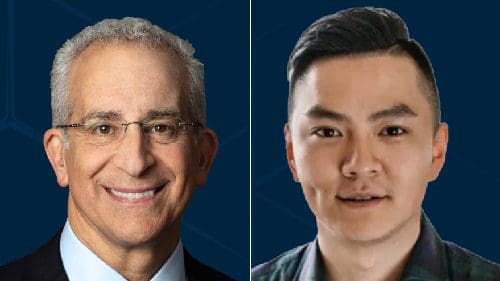
CB: Congratulations on being named to Time Magazine’s 2022 Best Inventions of 2022 list and being named as a CES 2023 Innovation Awards Program honoree. That is an impressive accomplishment. Tell me about how and why you started your company?
JY: Back in 2016, I was working in a co-working space and doing some basic survey while using a 13-inch old laptop. It was a really small display. I felt really handicapped because I had to switch back and forth between the research document and the visual basic software. It indeed reduced work productivity and joyfulness.
I had the idea of hanging a monitor off the back of the laptop. Whenever you need it, you can slide it back. It was a great idea. I went back to build the first prototype while I was still in my master’s program at MIT. And all the surroundings were surprised about that prototype.
I didn’t jump into starting up my own company right after, as it required a lot of effort I got Amazon’s full-time offer after an internship. However, I cannot shake off the idea of inventing and producing portable monitors. Therefore, I invited my partner/co-founder Stephen, and together we applied for equity funding (received $8000), launched a Kickstarter project and then transitioned into a Google campaign. Within the Kickstarter, we sold thousands of monitors, around $1.5 million in presale, just in one month. All the dots connected and lined up for us. And that’s the moment I started the business of Mobile Pixels, instead of showing up at Amazon.
CB: What challenges did you experience along the way?
JY: The initial manufacturing process was very stressful, and I realized some hardware could not be used directly. The team needed to assemble and test it out. That was very stressful Some sellers modified our design. Facing this challenge, we are not only building our brand to protect ourselves, but also continuing to innovate.
CB: What advice do you have for those interested in becoming an entrepreneur and starting acompany?
JY: Love your products and innovation from the bottom of your heart. When you see someone using your innovation or product, that sense of achievement and ecstasy cannot be described in words. When you truly love your products and receive positive feedback from the market, you gain the power to continue the journey.
CB: What future plans do you have for Mobile Pixels? Where do you see the company in 5 years?
JY: We plan to continue valuing user experience and not just meeting quota. Mobile Pixels will drive to bring people the best user-friendly monitors to work from anywhere! We truly love our products, and always think from the customer’s side, not trying to compete outside to meet some quota.
In the post-pandemic era, more people are working out of the office. During 2020, Mobile Pixels had its scale grow around 3 times, as people started to work from home. We think this trend continues to grow. And we are here to innovate, push out the industry limit, bridge the market gap, and provide customers with seamless plug-and-play products We plan to make a push on the B2B side. There are a lot of great resellers and solution providers We hope to collaborate more with them and increase our market scale.
We hope to collaborate more with them and increase our market scale.
CB: How did you come to work with the co-founders of Mobile Pixels? And, what were your initial impressions of them as well as the technology they developed?
PL: I was introduced to the co-founders of the company, Jack and Stephen, in the fall of 2017. They had developed a prototype of their first product and they wanted to protect it. In January 2018, shortly after we met and discussed their business plans and how we might assist them with utility and design patents, they officially formed Mobile Pixels. Later that year they received funding through local accelerators and a Kickstarter campaign.
My first impression was that they had found a useful niche area to develop into a business. They were starting their business with a core product, an auxiliary monitor for a laptop, that was a foundational piece to expand upon. They also did their homework with consumer and market research, employing product designers, marketing and PR consultants, reviewing alternative and competitive products, and exploring potential component suppliers. Given this broad groundwork in all facets of the business and the foresight to determine market needs and limitations, I was excited to support the company in any way possible through the initial product launch – which occurred not long after we first met.
CB: How did Intellectual Property (IP) contribute to the growth of the company, and can you outline a few of the specific challenges?
PL: Most start-ups are rightly concerned about clearance and freedom-to-operate issues. Because the company had done thorough research of the marketplace, including potential consumer markets and potential competitors, however, we were able to begin working together at a stage further along than most start-ups are when we engage with them. Initially, the focus was on protecting the core developments with provisional/utility and design patents, and trademarks. These efforts continue to date, as the company has expanded its product offerings worldwide.
Like any good idea finding a market need, it was not long before several competitors promoted similar, but lower quality, alternatives. This will always be a challenge for the company, particularly one offering hardware solutions that appear basic in design and application. As we know, the demand for two and three auxiliary monitors and related products has grown as remote work has become the ubiquitous since the pandemic. The rapid growth of Mobile Pixels also presents welcome challenges for the production and supply of its products, and for the development of other elegantly-designed tools that will support expansion into related areas including desktop monitor systems and supplementary devices. We work closely with the company’s product development team to prepare patent, design, and trademark applications that cover both present and future versions of these products.
We also support the company by vigilantly monitoring competitive activity in the market and at the USPTO. For example, this past year, it was necessary to bring suit against a competitor for patent infringement. This suit settled on favorable terms, but we have since provided notice to several others. In these instances, proper protection of the company’s IP was critical to prevent copying, and to force competitors into alternative designs that have proven inferior in both cost and functionality.
The company’s IP is also integral to international aspects of the business. Sales in several regions are sustained by a network of distributors and sales teams preferring to represent patented products with registered trademarks.
CB: How has your work with the company evolved since those early days? Where do they go from here, and what are some of the things a growing tech company such as theirs should be aware of from an IP perspective?
PL: Our work with Mobile Pixels has evolved significantly since we first met, and we continue to support the company with various IP filings worldwide. Their IP portfolio has become more sophisticated as they have grown from their initial prototype, and continue to find creative approaches to the design and implementation of their consumer offerings.
There are many opportunities for the company to explore in the future, alone or in collaboration with others, that might even result in expansion in unexpected directions. I could imagine these including, for example, marketing and promotional devices for retailers and entertainment venues, industrial monitors, and residential/consumer user interfaces for appliances and transportation.
From an IP perspective, rapidly growing technology companies like Mobile Pixels need to identify opportunities that will reimagine their innovations in new and different consumer markets and applications. Of course, the ongoing evolution of a company’s ideas is always necessary to enhance the marketability and usefulness of their products. Protecting these developments is of utmost importance, as is the associated competitive intelligence, and there should be an emphasis on looking at the market holistically. This means not only monitoring direct competitors, but also indirect competitors, suppliers, and customers. Given the convergence and interconnectedness of technologies, opportunities to leverage and accelerate innovations abound through IP-enabled collaborations.
About Mobile Pixels
Mobile Pixels was founded in 2018 out of MIT. We combined the best technology in the market to create a lightweight portable monitor that increases people’s productivity. How? Our user-centric design process makes the experience seamless and simple to use for digital nomads. For example, unlike the standard desk-mounted monitor, the displays draw power directly from the laptop and take 2 min to set up.
Mobile Pixels bootstrapped itself in 2018 and grew to $53 million in 4 years. Features on BuzzFeed, Geeky Gadgets, WIRED, Boston Business Journal have recognized us for making the multi-monitor experience portable. We were awarded the Best Invention in 2022 by Time. So far, Mobile Pixels has shipped more than 300,000 units worldwide!
More info can be found at: https://www.mobilepixels.us/
About Peter Lando, Lando & Anastasi, LLP
Peter Lando is a partner at Boston intellectual property law firm, Lando & Anastasi, LLP. He can be reached at PLando@LALaw.com or 617-395-7002.
More info can be found at: https://www.lalaw.com/people/peter-c-lando
About Lando & Anastasi, LLP
Lando & Anastasi, LLP (L&A) partners with clients to protect their innovations through effective intellectual property strategies related to patent, trademark and copyright procurement, licensing and associated transactions, counseling, trade secrets, and litigation. This partnership complements an emphasis on creative and strategic solutions guided by a solid understanding of each client’s business imperatives. Well versed in a wide range of industries including life sciences, software, cleantech, medical devices, chemical and electrical engineering, L&A attorneys counsel clients ranging from individuals to early-stage and venture-backed start-ups to small and large national and global corporations. For more information and the latest firm news, please visit lalaw.com and follow the firm on LinkedIn and Twitter.





























































